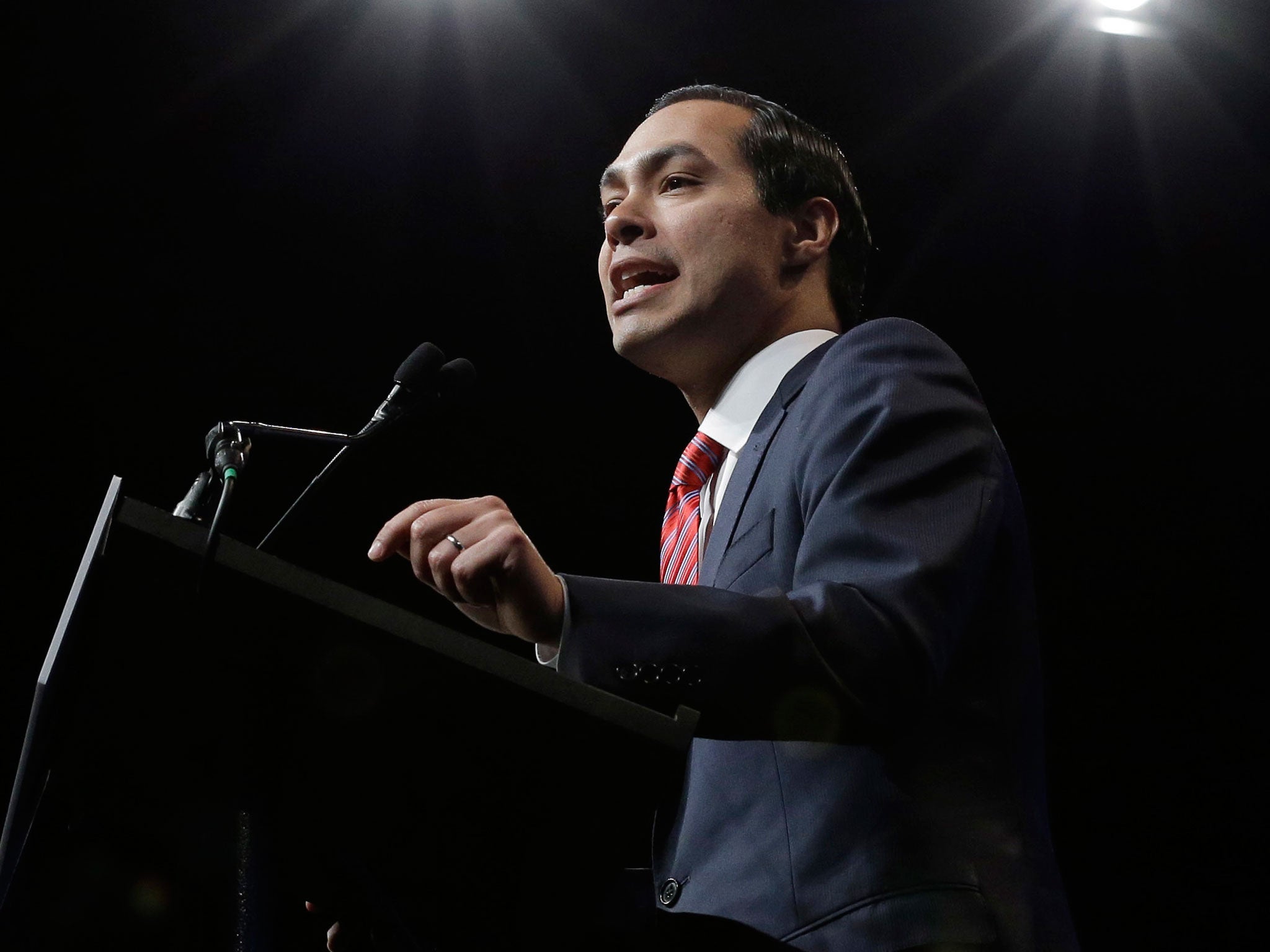Let's talk about what we'd be talking about if Julian Castro was white
Castro has spent his candidacy focusing on the needs of our country's most vulnerable people. And that might end up costing him the nomination


Your support helps us to tell the story
From reproductive rights to climate change to Big Tech, The Independent is on the ground when the story is developing. Whether it's investigating the financials of Elon Musk's pro-Trump PAC or producing our latest documentary, 'The A Word', which shines a light on the American women fighting for reproductive rights, we know how important it is to parse out the facts from the messaging.
At such a critical moment in US history, we need reporters on the ground. Your donation allows us to keep sending journalists to speak to both sides of the story.
The Independent is trusted by Americans across the entire political spectrum. And unlike many other quality news outlets, we choose not to lock Americans out of our reporting and analysis with paywalls. We believe quality journalism should be available to everyone, paid for by those who can afford it.
Your support makes all the difference.Though he did not have what many would categorize as a “breakout moment” during the most recent Democratic presidential primary debate, Julián Castro did offer another reminder of why his candidacy has been essential to the primary itself — even if most observers have failed to recognize it.
When one of the moderators, CNN’s Anderson Cooper, askedCastro about handgun violence, he offered much-needed nuance to the debate with the invocation of the police and how their collective behavior influences his views on gun policy. Explaining why he doesn’t support mandatory buybacks, Castro said, “I’m not going to give these police officers another reason to go door-to-door in certain communities because police violence is also gun violence.” Castro then cited Atatiana Jefferson, a 28-year-old who was in her bedroom when she was shot and killed by Fort Worth police officer Aaron Dean. Jefferson’s neighbor, James Smith, dialed the Fort Worth Police Department’s non-emergency line after he noticed Jefferson’s lights were on and her front door was open.
No one else had said her name. No one else had invoked the role police play in gun violence — namely against black and brown people. And this incident took place mere weeks after Dallas police officer Amber Guyger was sentenced to 10 years in prison for murdering Botham Jean in his home a year ago. How many more minutes would have been wasted had Castro not brought that vital perspective onto that stage?
I felt similarly about the necessity of Castro earlier this month when he escorted a group of asylum-seekers across the border bridge to Texas from Mexico, where they were all sent under the Trump administration’s “Remain in Mexico” policy. That group consisted of eight gay and lesbian asylum-seekers from Cuba, Guatemala and Honduras, as well as a deaf Salvadoran woman and her three relatives. As the Los Angeles Timesreported, “All had earlier tried to cross here with a lawyer after being returned to Mexico to await court hearings, and all had been sent back by US Customs officers. Some had already waited four months.”
And then there was hiscall this summer to consider trans people in the debate about reproductive justice.
Since April, many political observers have written about Castro’s need for that breakout “defining moment” in order to draw wider attention to his campaign — but perhaps the larger problem is the public don’t care enough about many of the types of people Castro has been advocating for throughout the decade. That includes people like Castro himself. Him being the sole Latinx candidate in the race should have garnered him more attention, but that has not proven to be the case.
“This should be Julián Castro’s moment,” David Freedlander wrote for Politico in August. “At a time when issues of immigration and family separation, race and the border are front and center in the national consciousness, the story of a third-generation Mexican American would seem tailor-made to resonate emotionally with voters.”
Freelander was right to highlight that Castro has struggled with Latinx voters, too, but in the earliest months of a primary campaign, much of a presidential contender’s chances lie on name recognition: either having it already or garnering the media attention necessary to build it.
“Castro is an heir to Obama, having served as secretary of Housing and Urban Development from 2014 to 2017,” Freelander continued. “He is young, just 44 at a time when many in the party are looking for a new generation. He is a policy wonk, a former mayor who can speak as fluently about zoning, gentrification and housing affordability at a time when those issues have risen to the fore among the party’s young and urban base.”
Somehow, Mayor Pete Buttigieg was hailed as “the smart candidate” early on, despite openly dismissing the need of policy details earlier in the race (yes, I laughed at him trying to attack Elizabeth Warren on being evasive on policy proposals, too.) It’s funny how that label wasn’t given to Castro, someone whose resume and proposed policies are far more impressive on paper.
And while we’re on double standards, I’m equally tickled how Castro was condemned as being “classless” for the way he spoke to Joe Biden at the third debate, yet none of those same people had anything to say about Biden yelling at Elizabeth Warren at the fourth as he tried to take credit for her work. I wonder what could be the difference? Perhaps we can ask Cory Booker and Kamala Harris, who faced similar scolding about how they challenged Biden, too.
Infuriatingly, even when Castro takes on a more popular position — say, impeaching Trump — he isn’t typically given credit for being the first candidate to bring it up.
As it stands now, Castro may not make the November date. If that is the case, it will be to our own collective loss. Castro has consistently used his position to highlight issues plaguing the most vulnerable of Americans. There is a thoughtfulness to his campaign that has consistently felt more in tune with where this country is going than many of his competitors’. In a crowded race stuffed with moderate bores with no chance of winning given their names on the ballot are Ambien to nonwhites and young people, he has been a worthy addition.
It is disappointing to say the least that Castro has not been treated like a viable option. I can’t think of anything he should have done differently. But I can say I believe that if Castro were a white candidate with the same credentials, saying the exact same things as he has been, this race would have gone differently for sure.
Join our commenting forum
Join thought-provoking conversations, follow other Independent readers and see their replies
Comments